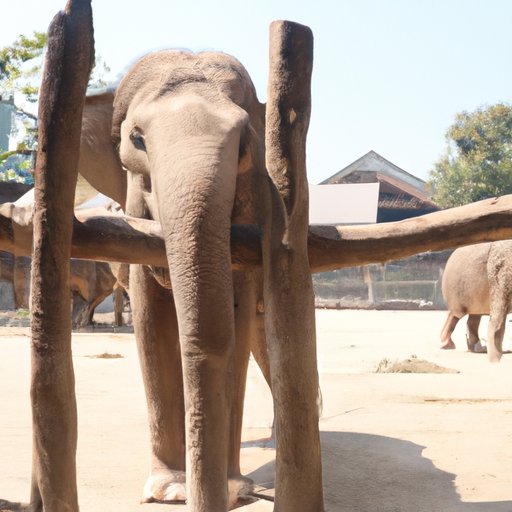Introduction
Elephant conservation is crucial to maintaining healthy ecosystems and preserving one of nature’s most extraordinary creatures. Elephants are not only significant to the environment but also hold great cultural importance in many societies around the world. The purpose of this article is to inform readers about the reasons for the declining elephant population and the various conservation efforts aimed at saving them.
Factors Contributing to the Endangerment of Elephants
Poaching and the Ivory Trade
The demand for ivory products is the leading threat to elephant populations worldwide. Each year, about 20,000 elephants are killed for their tusks, with populations declining at alarming rates. The illegal ivory trade has caused an increase in poaching activities since the demand for ivory remains high, particularly in Asian countries like China and Vietnam.
The loss of elephant populations affects ecosystems, local economies, and the moral fibre of society. The demand for ivory must be put to an end to save elephant populations across the globe.
Habitat Loss and Fragmentation
Human activities, including deforestation and land use change to allow for agriculture and urbanization, are shrinking elephant habitats at an alarming rate. As a result, elephants are forced to live in smaller areas and compete for limited resources. Fragmentation of elephant habitats also causes genetic isolation among elephant populations and can lead to inbreeding and a reduced capacity for adaptation to environmental changes.
Climate Change and its effects on Elephant Populations
Climate change affects elephant habitats and food resources in various ways, including changes in rainfall patterns, drought, and heatwaves. These environmental changes disrupt the migration patterns of elephants and can worsen their food shortage problems leading to further challenges for their survival.
International and National Efforts Towards Elephant Conservation and Protection
International Organizations Involved in Elephant Conservation
Many international organizations are involved in elephant conservation, including the Convention on International Trade in Endangered Species (CITES), the International Union for Conservation of Nature (IUCN), and the Wildlife Conservation Society (WCS). These organizations work with governments across the globe to create policies and laws that protect elephants and their natural habitats.
National Laws and Regulations to Protect Elephants
Elephants are legally protected in many countries around the world, and international trade in elephant ivory is illegal. The United States, for example, enacted laws to protect elephants, such as the Endangered Species Act in 1973 and the Elephant Conservation Act in 1988.
Conservation Projects in Different Parts of the World
Several conservation projects are underway across the globe to safeguard elephant populations, including anti-poaching measures, habitat restoration, monitoring programs, and community-based conservation projects.
The Importance of Elephants in Maintaining Healthy Ecosystems
Elephants play a critical role in maintaining ecosystems. They act as seed dispersers, create pathways and clearings in dense forests, and recycle nutrients while giving other better adapted animals a chance to thrive.
The decline in elephant populations could lead to ecological impacts, including increased shrub cover, reduced biodiversity, and loss of habitat for other animals. Understanding the importance of elephants in maintaining healthy ecosystems can help drive conservation efforts.
Cultural Significance of Elephants
Elephants are essential to many cultures worldwide. Many countries have celebrated elephant cultures, and elephants appear in various local myths and traditional beliefs. In Africa, elephant hunting is a rite of passage for many cultures, and in India, elephants are a crucial part of religious festivals, ceremonies, and even marriages.
The relationship between elephants and local communities has been strengthened in recent years with the involvement of local peoples in elephant conservation projects, boosting local economies’ conservation benefits and providing support to conservation efforts.
The Economics of Elephant Conservation
The economic impact of elephant conservation is visible from different angles. Tourism has emerged as a significant source of income in several countries where elephants are a major tourist attraction. On the other hand, the decline of elephant populations and the illegal ivory trade have negatively impacted local economies.
Protecting elephants is a moral, ecological, and economic issue. By protecting elephants, we protect the local economies that benefit from tourism, safeguard biodiversity in different ecosystems, and maintain the environmental and cultural heritage associated with these magnificent creatures.
Consequences of Failing to Protect Elephants
If we continue to fail elephants, the consequences could be disastrous. Declining elephant populations impact local tourism and severely affect economies relying on it, especially in African countries. The long-term effects on biodiversity of losing elephant populations are significant, and once lost, the species might never be restored, leading to a devastating loss to our heritage and ecological diversity.
Conservation Approaches and Success Stories
Successful conservation efforts like those implemented in Kenya’s Amboseli National Park where the African Conservation Centre has developed private landowner partnerships that allowed elephants to expand their ranges into private ranches, and community-based conservation projects in Tanzania’s Tarangire-Manyara ecosystem, which has seen the recovery of elephant populations, are examples of what can be done to save elephants.
Conclusion
The efforts to save elephants from extinction have been ongoing for decades, and there are still many more steps to take to ensure their survival. It’s imperative to continue to address the factors contributing to the decline of elephants, enforce regulations banning the ivory trade, and protect their habitats to ensure healthy ecosystems, local economies’ sustainability, and the conservation of our heritage. It’s an issue that affects everyone and demands the cooperation of all nations and peoples around the world to succeed.
Call to action: Let’s support elephant conservation efforts by avoiding buying any ivory products. It also helps to spread the word about the importance of elephant conservation and contribute to supporting global conservation organizations.
